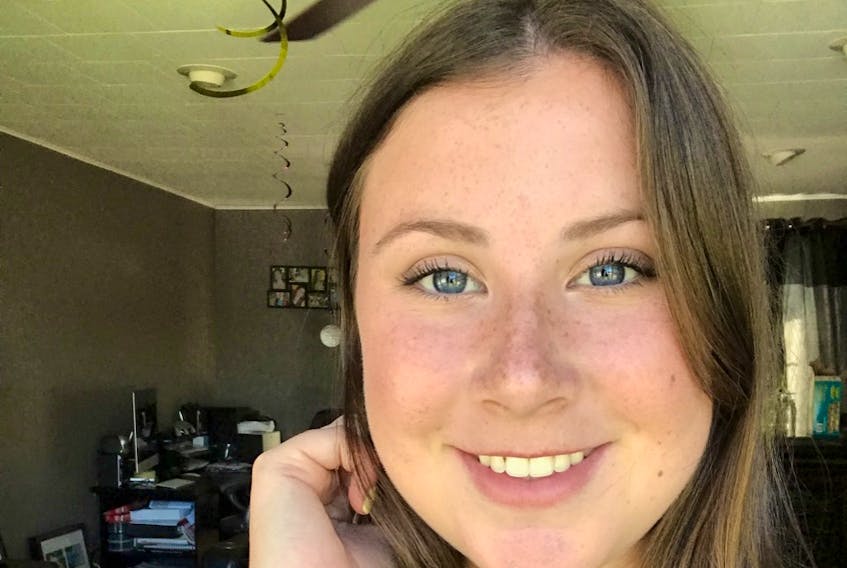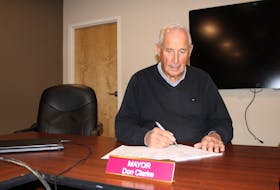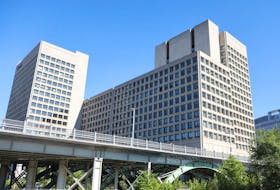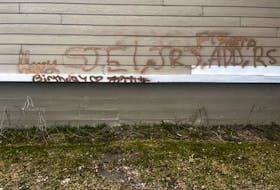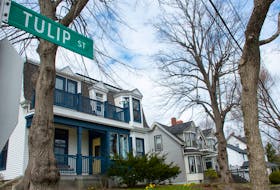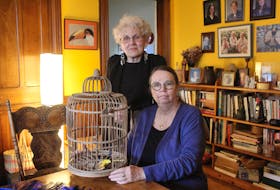Editor's Note: This story contains sensitive details that may upset some readers. This article is part of a special report on sexual assault in Cape Breton, N.S.
SYDNEY, N.S. - Tesa Ramsay doesn’t have many flashbacks of the night she was sexually assaulted on New Year’s Eve, 2018.
But she still can’t shake the feeling that, as a woman, she isn’t valued by men as anything more than something to be used for sexual gratification.
“I feel now like I’m not special (in a man’s eyes), like I’m just here to please guys,” the Saint. Mary’s University business student said during a phone interview.
"Dating and boyfriends? That's not for me yet."
Ramsay's assailant was a grade below her in school, someone she had been talking to for a few weeks, who she “totally trusted.” When he asked if she wanted to go outside, leave the crowd for a bit, she thought it was for a customary "goodbye 2017" kiss.
When he suggested they get out of the cold and go a friend's car, Ramsay didn't realize his intentions were different. He overpowered her and sexually assaulted her, while Ramsay pleaded with him to stop. Ramsay said he didn't stop. Not even after the four times she threw up.
Ramsay returned to the party, crying. Some people she trusted noticed and the situation was dealt with in the way she requested — even though some wanted her to report it to police. Ramsay didn't want anyone to know except for the few she confided in, who helped her in the beginning phase of her healing.
“In high school, I was very innocent. I had only kissed one other boy before,” said Ramsay who was 17 when she was assaulted.
“What I went through (that night), I was thinking it’s just me, I’m making more out of it than I should … It’s normal for guys to treat women like that.”
The then Grade 12 student also didn't want to ruin her last year of high school and become known as "the girl who was assaulted."
The first two years of high school for Ramsay weren’t good. Diagnosed with Crohn’s disease and rheumatoid arthritis in Grade 10, the now 19-year-old said she lost friends after that.
“In Grade 11, I ate my lunch alone in the bathroom. In Grade 12, I met my two best friends. Things were finally going right,” she said, her voice cracking as she held back tears.
After her assault, Ramsay also feared other students knowing about what happened in the school because of the victim blaming comments that she was likely going to hear.
“He was in the same crowd as the cool kids in my grade, so I didn’t want it to get out because I didn’t want people to think I was a loser … I was afraid I’d stop being Tesa and become “that girl.”
Guilt and shame set in quickly for Ramsay. What if she hadn’t been drinking alcohol? What if she hadn’t gone outside with him? What if her tops didn’t show off her figure so much? What if she had fought harder?
“I never, ever dreamed that people would take advantage of each other like this or take so much away from them in just a few minutes,” Ramsay said, adding, “I felt so alone.”
Now, though, things have changed for Ramsay and an Instagram post she made on New Year's 2019 — one year after the attack — showed her she isn't alone. She wants her story to be heard by other victims of sexual violence, so they know they aren’t alone.
“After I made my post… I had survivors (of sexual assault) message me to say they didn’t go to police either," she said. "It made me realize this is happening everywhere and girls are scared."
Victims of intimate partner violence truly aren’t alone. Statistics highlighted on the Sexual Assault Centre Hamilton and Area (SACHA) website indicate there are 460,000 sexual assaults in Canada every year and 39 per cent of adult women have been sexually assaulted at least once since they were 16.

Ramsay also isn’t alone when it comes to her feelings, injuries and healing process, according to Rachel Doucette and Carrie Evely, who both work with victims of sexual assault.
Distrust in others, diminished self-worth and flashbacks are some of the most common things victims of sexual assault experience afterwards. Other common feelings include distrust of self/self-blame, anxiety and depression. And there's no time limit to how long they will continue.
“They can feel helplessness. They can feel worthlessness. She’s (he’s) had her power taken away. She’s been objectified,” said Doucette, the SANE (Sexual Assault Nurse Examiner) co-ordinator for the program which runs out of Every Woman’s Centre.
For the past three years, Doucette and her team have been working primarily with victims within the first five days of the assault and often hear these things from people they help.
Evely is clinical manager at Cape Breton Transition House who works primarily with victims after this time frame and she said these feelings continue for weeks, months and years for some people.
“Self-worth and self-esteem are damaged. Sexual assault is a violation,” she said. “And many victims feel shame and guilt … It is never the victim's fault. No one ever asks to be assaulted.”
Both Doucette and Evely stressed healing from trauma looks different for everyone, despite some commonalities in mental health injuries caused by the trauma. Because of this, both SANE and transition house programming are client (victim) — centred; meeting the person where they are at, giving them the power to decide on how to proceed and what healing looks like for them.
“It’s hard to generalize (the healing process for victims) … It’s not one size fits all,” Evely said. “There’s so many different factors when someone is dealing with trauma and so many different therapeutic treatments available.”
One of these factors is the type of support system the victim has. For Ramsay, she had immediate support from a small group of close friends and family. She didn’t want to report it to police and they didn’t force her. When she didn’t want to continue counselling, no one forced her. Instead of being shamed in any way, Ramsay was supported in her decisions and given back her power over the situation.
This is an example of a positive support system — something Evely said might be the most important thing in helping victims of sexual assault heal from their injuries.
“Supports looks different for different people, but, having that positive support system in place is very important,” she said.
“People to validate your feelings, who believe you, who help you move through the healing process … It has to be a positive support system because beating (the victim) down, making them feel guilt and shame, that doesn’t help them.”
Ramsay’s healing process also includes going public about her experiences, first with her Instagram post and now by speaking to media.
“I felt like if I didn’t come to terms with it, if I didn’t say it happened, then it would stay with me and it would still have power over me,” she said.
Going public is a decision Ramsay’s family worried about, afraid she’ll be retraumatized and revictimized, especially if negative comments are directed at her. But it’s something Ramsay feels she needs to do as she continues her healing journey.
“I want to make people aware of how common it is. It shouldn’t be happening. It ruins people’s lives in a bad way,” Ramsay said, her voice strong with determination she will help victims smile "for real again".
“And I want the parents to teach their kids the rights and wrongs of how to respect people. People are lacking in that these days.”
Need to talk?
- Victims of sexual assault can reach out to:
- Cape Breton Transition House crisis line: 902-539-2945
- NSHA Mental Health crisis line: 1-888-429-8167
- The Cape Breton Youth Project (LGBTQ+): 902 578-5801
- *Both crisis lines are open all day, every day of the year.
- Prince Edward Island rape and sexual assault centre counselling request line: 1-888-368-8055
- Newfoundland and Labrador Sexual Assault Crisis and Prevention Centre crisis hotline: 1-800-726-2743
Want to report a sexual assault?
- SANE program crisis line: 1-844-858-8036
- Police: 911
- Or in person:
- Cape Breton Regional Hospital
- Family doctor with five days of assault
RELATED
- Getting help for sexual assault victims in Cape Breton
- Cape Breton man upset by police questions, actions while reporting sexual assault
- Perpetrators of sexual, domestic violence all different says Cape Breton clinician
- Services lacking for male victims of sexual assault in Cape Breton, provincially
- NIKKI SULLIVAN: I'm finally telling my truth about sexual assault

